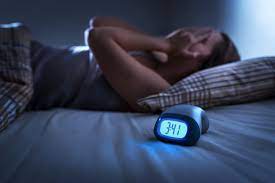- Insomnia Part 1 of 3
- Insomnia Part 2 of 3
- Insomnia Part 3 of 3

Insomnia Part I
“I am so jealous of my husband. The minute his head hits the pillow he is sound asleep.” This is something that I am hearing more and more often.
Insomnia is one of the most common symptoms that I hear from patients and it is becoming more and more prevalent. As with any symptom that we have it is a sign that our body is out of balance. More often than not many people resort to over-the-counter medications such as Tylenol PM or Benadryl. Others will ask their doctor to prescribe a medication such as Ambien, Trazadone or Lunesta. Many who come to the Renaissance Health Centre are more inclined to take more natural herbal or nutritional supplements like melatonin, magnesium or ashwaganda.
Although these interventions may be helping with their sleep it is not really addressing the underlying cause. In the 35 years that I have been practicing I am always looking for better ways to treat patients to restore balance or to cure. For insomnia there are 3 basic underlying issue that I most commonly find.
- Hormonal Imbalance. This affects primarily women in their mid to late 40’s or early 50’s as they approach menopause. One of the first hormones to drop during this time in a woman’s life is progesterone. As a result they become estrogen dominant. Progesterone is known to have a sedative effect on the brain which is opposite to the effect of the estrogens which have an excitatory effect. Not only do women find they have difficulty sleeping but also they begin to experience hot flashes, heavy menstrual bleeding, anxious PMS, increased anxiety, tension and irritability. By starting women on bio-identical progesterone which is made from wild yam, their natural hormonal balance returns resulting in the ability to fall asleep quickly and stay asleep. In addition, all the other associated symptoms of being estrogen dominant dissipate.
Terry Pfau DO HMD
